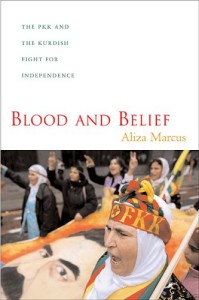|
Reviewed by Richard Saccone, Ph.D., Assistant Professor of Political Science at St. Vincent College Three letters, PKK, raise the eyebrows of many and strike fear into others depending on one’s familiarity with that part of the world encompassing Turkey, Iran, Iraq and Syria. The story of the Kurdistan Workers Party (PKK) is built on elements of communism, nationalism, ethnic struggle and most familiar to Americans—terrorism. What most outsiders know of the PKK is linked to bombings, killings and destruction in eastern Turkey and, more recently, conflict between American, Turkish and Iraq governments over the pursuit of the PKK into northern Iraq by the Turkish military. But the tale of this enigmatic group is nothing absent the story of its charismatic leader, Abdullah Ocalan. For this reason, Aliza Marcus’s book about the PKK, Blood and Belief: The PKK and the Kurdish Fight for Independence, devotes much of its more than 300 pages to Ocalan’s life, influence and legacy. Through exclusive interviews with PKK leaders, independent activists, opponents and others knowledgeable of the organization’s history, the author lays out an exhaustive background of both the PKK and Ocalan. Born into the poverty and discrimination suffered by the Kurds in eastern Turkey, Ocalan’s desire for a distinct homeland for his people led him into a revolutionary struggle with at least four governments and dozens of other ethnic leaders. With a population of between 30-50 million people, the Kurdish nation spans eastern Turkey, northern Iraq, northeastern Syria and western Iran. While the PKK was founded some thirty years ago to aid the disenfranchised Kurds of Turkey, in some ways it touched the hopes of Kurds everywhere that secretly longed for a homeland somewhere in the region. Ocalan overcame seemingly insurmountable obstacles to build his organization. He came from humble birth, with no family connections and little formal education, but he founded the PKK in 1978, quickly consolidating his power like a seasoned warlord, ruling with an iron fist and eliminating all opposition. Relying on communist ideology, his own wit and mysterious charisma, Ocalan attracted loyal followers willing to sacrifice everything living the guerilla life in the rugged mountains while fighting a far superior force in the Turkish Army. For years, PKK operations cost the Turkish government billions of dollars to fight while “tying up a quarter of NATO’s second largest army in a domestic battle.” Along the way, Ocalan received assistance and safe haven from Syria, Iran and Iraq each using the PKK as a pawn in its own quarrels with Turkey. Ocalan shrewdly understood the relationships and used them to his political advantage. As with anyone that accrues that much individual power, Ocalan overestimated his own ability. Accused as being narcissistic and a paranoid dictator—as well as militarily inept—he still mesmerized enough followers to keep the organization intact despite frequent defeats and setbacks. Few books written in English contain this depth of detail concerning the inner workings of the PKK. It is certainly not a book for those with a mere passing interest in the subject matter. At times, the daunting details in Marcus’s book made for slow reading until it picks back up with the climactic capture and trial of Ocalan in 1999. Marcus documents the hectic period Ocalan spent shuffling between several European and African countries that refused his asylum attempting to avoid a political hot potato. While in truth they may have agreed with him, these leaders knew what a political liability it would be to offer protection for Ocalan. Finally, Turkish agents skillfully abducted him in Kenya and brought him back to Turkey, where he was tried and sentenced to death—a sentence that was commuted to life in prison when Turkey abolished the death penalty under EU pressure. Ocalan now lives as an isolated prisoner in Turkey continuing to reign as the symbol of Kurdish nationalism to loyal followers. I would definitely recommend Blood and Belief for academics or other researchers looking for detailed background on the PKK. Additional pictures would have enhanced the material and research of this depth surely produced more than the handful provided. The timeline in the back, however, certainly enhanced the book by helping readers keep track of important dates and events. Overall, Marcus’s book is useful for those trying to understand the Kurdish plight. It helps readers recognize that relatively few Kurds in Turkey side with the politics and violence of the PKK, however, a larger group may agree with the desire for separation. As a result of Marcus’s detailed historical analysis and authoritative sources, Blood and Belief stands alone as an authoritative source of PKK history from the mouths of those who created it. |


 Blood and Belief: The PKK and the Kurdish Fight for Independence
Blood and Belief: The PKK and the Kurdish Fight for Independence